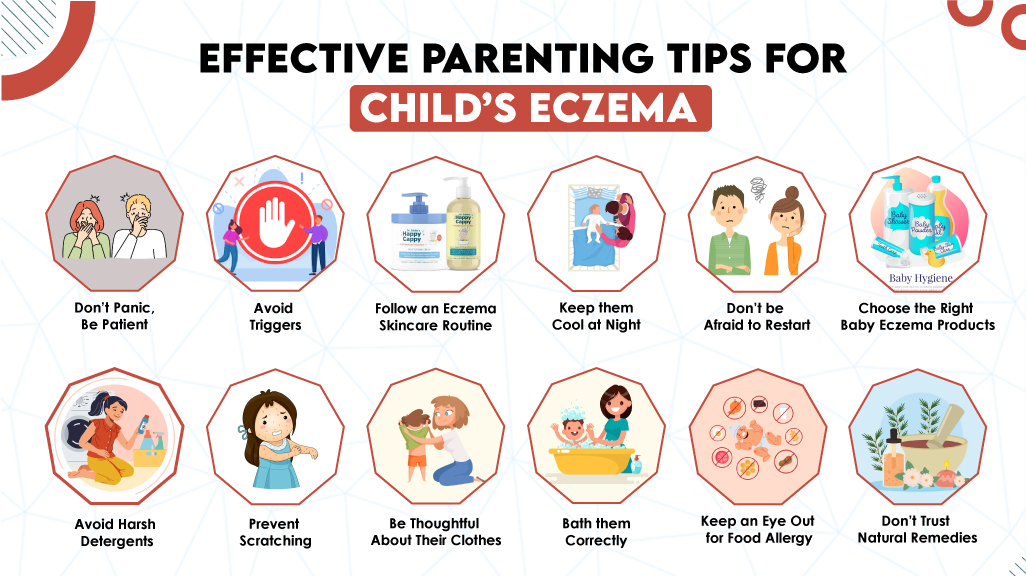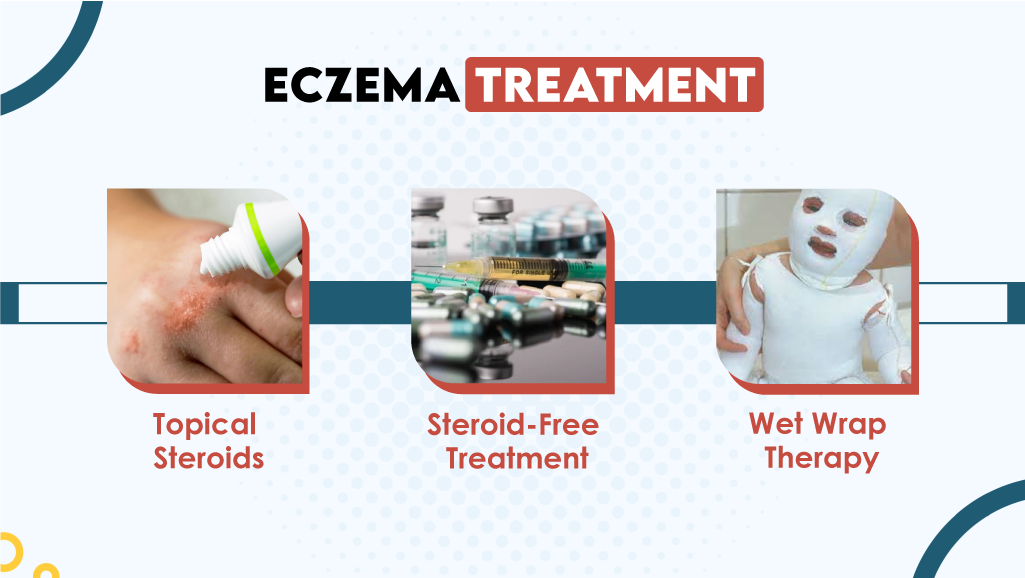
Eczema is a common problem among people of all ages, but baby eczema can be especially challenging. Seeing a red, irritated rash spreading over your little one’s skin can be alarming, but it’s important to remember that there are a number of effective treatments that help relieve symptoms.
Understanding Eczema
According to the American Academy of Dermatology, around 25% of babies are affected by eczema or Atopic dermatitis. And most of the people who are dealing with eczema develop it before the age of 1 year old.
Baby eczema can cause itchy, dry, rough, red rashes on the skin. In some cases small bumps and blisters may appear on the skin that may ooze when proper treatment and attention are not given.
The exact cause of this skin condition is still unknown. However, it is believed to be caused by a combination of factors and triggers, such as an impaired skin barrier, a weakened immune system, genetics, weather conditions, dry air, skin irritants, and allergens.
Eczema, when experienced by young infants, usually appears on the face, cheeks, chin, and forehead. In older babies, around six months to 12 months, it usually affects their face, skinfolds, elbows, and knees. In toddlers, it can also appear around their mouth, eyelids, hands, and ankles.
Even though there is no permanent cure for it, there are things that you can do to help your baby soothe its eczema flare-up.
12 Effective Parenting Tips

When they say it takes a village to raise the child, believe me, it’s true, especially if your child is dealing with eczema. Intense itching can disrupt their sleep and wake them up in the middle of the night.
But don’t worry, we are here to help you. These effective parenting tips for eczema can greatly improve the quality of life for your baby and everyone in the family.
1. Don’t Panic, Be Patient
The best and most important thing you should do is not panic and be patient. We know you will be worried, especially if this is the first time you have witnessed eczema. You will only be able to take care of your baby properly if you are calm and relaxed.
Yes, eczema can be really irritating and bothersome for your baby, but if you stay patient and follow a consistent eczema skincare routine in conjunction with the treatment prescribed by the doctor, you will be able to soothe the flare-up easily.
2. Avoid Triggers
Certain triggers, such as dry air, irritating fabrics, harsh chemicals in skin care products, and dust mites, can trigger an eczema flare-up or worsen the condition. If you know what might be triggering your baby’s eczema, then try avoiding it to prevent eczema in the first place.
It can be very hard to pinpoint the triggers. You can do this either on your own by monitoring what you use or when the flare-up triggers or by consulting a doctor for help.
3. Follow an Eczema Skincare Routine
Skincare is one of the most important tips for eczema. The right skincare routine can relieve current symptoms and also help prevent future eczema flare-ups.
Cleansing
The first step in any effective eczema skincare routine is a bath. Bathe your baby every day for a maximum of 15 minutes in lukewarm water. Bathing the baby will help remove dirt, bacteria, or irritants that can make their condition worse.
Be sure to use a gentle baby eczema shampoo and body wash that is free from any skin-irritating chemicals. Completely rinse away all the suds, and then gently dry your baby with a soft towel in a patting motion.
Moisturizing
It’s important to always follow a bath with moisturizing. Apply baby eczema cream all over the body, focusing especially on the areas affected by eczema, immediately after bathing to help lock in moisture and protect the skin from irritants.
We suggest using a fast-absorbing eczema baby cream that is infused with ingredients like Glycerin and Licorice Root Extract to soothe and smooth affected skin. Moisturizing creams are often referred to as emollients. Using an emollient at least twice per day is very important to keep the skin moist and restore and protect the skin barrier.
4. Keep them Cool at Night
Parents of young babies rarely get enough sleep, but parents of babies with eczema are often much more sleep-deprived, as their young ones wake up frequently because of discomfort.
One way to ensure less nighttime distress is to keep your baby cool, as heat can aggravate a flare-up. Use a fan or air conditioning to keep the temperature in the baby’s room cool, but be careful not to take it too far, as extreme cold can also cause a flare-up.
A humidifier can also help keep the air in your baby’s room moist to prevent further aggravation.
5. Don’t be Afraid to Restart
It’s very likely that your baby will wake up in the middle of the night because of scratching or other eczema symptoms. Try re-starting the bedtime routine to signal the baby that it’s time to return to bed.
Give them a wipe-down with a cool cloth, apply another layer of moisturizer, and put them in a fresh set of pajamas. This can help comfort your baby and prepare them to get back to sleep.
6. Choose the Right Baby Eczema Products
Many baby products like soaps, body wash, and shampoo contain chemicals that can be too harsh on sensitive young skin, especially for babies suffering from eczema. This is why it is essential to use the right products on their skin to help soothe their condition instead of worsening it.
The best body wash for baby eczema is the one that is fragrance-free, paraben-free, sulfate-free, and phthalates-free. And same goes for moisturizers and sunscreen for babies with eczema. They should also be free from skin-irritating chemicals and labeled hypoallergenic.
7. Avoid Harsh Detergents
This is often an overlooked point by parents, but the chemicals in detergents you use to wash baby’s clothes and bedding can cause an eczema flare-up or worsen the condition.
Detergents often contain harmful chemicals that can easily irritate the skin.
According to the National Eczema Association, the best laundry detergent for babies with eczema is the one that is fragrance-free, dye-free, and hypoallergenic. They also advise using a liquid detergent instead of the powder ones as they don’t leave any residue behind in the clothes.
8. Prevent Scratching
Itching associated with eczema can become so intense sometimes that it can be difficult for adults to resist the scratch. And for babies it can be even harder as you can’t make them understand that scratching can cause infection and scars on skin.
So this becomes your responsibility to prevent them from scratching eczema. Make sure that their nails are trimmed constantly so that even if they scratch, it won’t hurt them. Other than that, you can use eczema sleeves for baby and mittens.
9. Be Thoughtful About Their Clothes
A flare-up can also be triggered in babies by clothing them in tight-fitting clothes or ones made from non-breathable material like synthetic fiber. Your baby may look cute in that Super Mario Bros costume, but if it is made from skin-irritating fabric, don’t make them wear it this Halloween.
Instead, choose loose-fitting clothes and the ones that are made from breathable fabric like cotton. And the same goes for their crib bedding if you use wool or flannel sheets, there are chances that it will make your baby’s eczema worse.
10. Bath them Correctly
We have discussed before that it is essential to keep your baby clean. There are chances that the questions “how often should you bathe a baby with eczema” or “do baths make baby eczema worse”? May have appeared in your mind.
Yes, you must understand that baths can worsen eczema if not given properly, which is why we have listed a few things that you should keep in mind for your baby’s baths.
- Bathing your baby 2 to 3 times a week can be enough in the first six months. However, you can wash them daily.
- Use lukewarm or cool water to bath your baby.
- Use a fragrance-free eczema baby wash to clean their skin.
- Limit their bath time to a maximum of 10 minutes
- Avoid bubble baths unless made using an appropriate hypoallergenic cleanser.
- After bathing them pat their skin dry instead of rubbing dry.
- Moisturize their skin within 3 minutes after taking a bath.
11. Keep an Eye Out for Food Allergy
Food allergies, even though the researchers have not understood the connection, but can trigger eczema flare-ups or make the condition worse for some people. So keep an eye out if your baby is allergic to a certain food or if you suspect any certain food item may be making the itching worse, and try staying away from it.
If you are unsure about whether your baby has any food allergies or not, you can consult a doctor, and they can run some tests to figure it out.
12. Don’t Trust Natural Remedies on the Internet
The Internet is loaded with blogs claiming that the natural remedies for eczema in babies can work wonders and make their eczema disappear. But don’t believe everything that you see on the internet.
Oatmeal bath for eczema in babies is believed to soothe the itching, irritation, and redness. This is true. However, it is best to consult your pediatrician before using any other natural baby eczema treatments.
13. Focus on Self-Care
Caring for a baby with eczema can be stressful. The emotional and physical drain can leave you worn out with nothing more to give. That’s why taking some time to care for yourself is important, too.
Make sure you get as much rest as you can, don’t forget to eat, and, if possible, set aside a few moments for yourself.
Eczema Treatment

If at-home eczema treatment, which includes avoiding the possible triggers and following a proper skincare routine, is not doing any good for your baby’s eczema. Then it is best to consult a doctor. They will most probably prescribe stronger medication to soothe baby eczema, such as:
Topical Steroids
For mild, moderate, and severe eczema cases, steroid creams are advised to apply to the affected area. Corticosteroid cream and ointment are often prescribed to soothe itching, dryness, and inflammation. Studies have shown that one should continue using a hypoallergenic eczema cream at the same time as the steroids are being applied to keep the skin moisturized.
Discuss with your treating physician which eczema cream is being used.
Night-time itching can lead to a reduction in the quality of life of children and their parents.
Some children may actually need an antihistamine to help stop the itching so they can get a good night’s sleep. If this is the case, you should speak to your healthcare provider so they can help manage this very important aspect of eczema care.
No matter what medication you are using or applying to help your baby, do it as advised by the doctor to avoid any further complications.
Steroid-Free Treatment
Some parents prefer to avoid using steroids for their babies. There are certain steroid-free treatments available for those parents, such as Dupixent, a prescription injectable, and crisaborole, pimecrolimus, and tacrolimus nonsteroidal topical creams.
These medications are by prescription only and should only be used as prescribed by your physician.
Wet Wrap Therapy
Wet wrap therapy is often advised for intense itching at night. This treatment should also be performed only after being suggested by your doctor and perhaps even under the supervision of a nurse if you are doing it for the first time.
In this, a layer of moisturizing cream and / or topical medication is applied to the affected area, which is covered with a wet gauze followed by a dry cloth or pajamas. This can be very effective in soothing intense itching and help the medication work better.
Conclusion
Eczema, a chronic skin condition in babies, can cause itchy, irritated, dry skin in babies. The itching can irritate the baby, making them fussy and disrupting sleep.
Even though there is no permanent cure for eczema taking care of the baby’s skin and implementing a few parenting tips like using fragrance-free baby eczema body wash, hypoallergenic eczema cream for babies, preventing them from scratching eczema, clothing them in light breathable fabrics, avoiding the triggers, and keeping your baby cool at night can help soothe their eczema.
Improve the quality of your and your baby’s life by soothing their eczema with Happy Cappy Eczema Products.
FAQs
How to emotionally deal with eczema?
Caring for a baby with eczema can sometimes take a toll on your mental health. Because the itching and irritation can make them fussy, cry more, and sleep less. But you should try to stay patient and calm as much as possible.
Stay calm by joining eczema support groups and coping with stress by doing yoga, exercise, and deep breathing techniques.
What is the number one cause of eczema in babies?
There is no single cause for eczema. It is caused by a combination of factors such as impaired skin barrier, weakened immune system, genetics, and environmental triggers.
What not to do with baby eczema?
If your baby has eczema, then avoid any triggers that can worsen their eczema, such as dry skin, irritating fabrics, excessive heat, sweating, drool, and products with harsh chemicals.
What is the 3-minute rule for eczema?
This means after giving your baby a bath, pat dry their skin with a soft towel and then immediately, within 3 minutes of taking a bath, apply eczema moisturizing cream all over their body, focusing more on the affected area.
What is the best thing for baby eczema?
The best thing you can do to soothe the itching and irritation associated with baby eczema is to moisturize your baby’s skin at least twice daily with a hypoallergenic eczema cream.
You can also use a corticosteroid cream if it is prescribed by the doctor.
